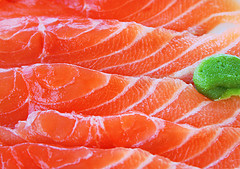Popular healthy fats always in the news are those omega-3 fish oils. What about them and the other fats called omega-6 and omega-9? Are supplements of fish oils (DHA and EPA) as healthy compared to consuming fish?
In the chemistry of these fats, the number signifies where the position of the double bond is within the fatty molecule. Double bond tell us that it is not a saturated fat. Saturated fats raise cholesterol. Our body is able to recognize these bonds and make them part of our outer cell membranes. So every cell in our body has certain amounts of different types of fats. These fats are not produced by our body but are totally dependent on our diet. Fish, when consumed as a regular part of our eating pattern, is protective against disease. It oils serve as valuable pieces within the outer part of our cells. Nuts and plant oils also help to maintain and keep the body healthy.
Fish has been known for decades as brain food. The colder and fatty the fish, the more omega-3 fats in that fish. Highest amounts are found in halibut, mackerel, salmon, sardines, trout and tuna. Other fish and crustaceans also have omega-3 fatty acids. Benefits come from eating almost any type of fish. Scientists think that most of the positive aspects of fish arise from the omega-3 fatty acids.
Renovating Your Mind thinks there is so much more in seafood than just the omega-3 fatty acids that are responsible for their amazing health benefits. Studies show lower risk of disease when consuming at least 2 fish meals per week. I consume three fish meals per week.
In the American Journal Of Clinical Nutrition was an article published 4/21/10. This experiment, lasting 2 years, involved 800 normal adult subjects that were divided into two groups. One group got placebo olive oil capsules, the others received fish oil. Participants were given concentration and memory tests before and after the study. They found no benefit for subjects on fish oils versus olive oil. Renovating You Mind draws two different conclusions from this study. This research wasn’t conducted long enough or you to consume fish not a supplement for positive results.
Eat fish.
It will not only help to keep your mental capabilities on target but it is fantastic for the rest of your body.
Past research has attributed fish consumption to less heart disease and stroke (ischemic only), decreased risks of dementia, improved glucose metabolism, less inflammation, lower blood pressure, decreased depression and lower chances for ADHD (attention deficit hyperactivity disorder). This is all due to plasticity.
Omega-3 fatty acids allow our cells to respond much better to other cells and the surrounding environment. When you regularly consume fish, the layer that holds our cells together is loaded with omega-3 fatty acids. These fats will lessen the pain of arthritis. They will decrease the blood pressure. Your chances of having a heart attack are lower because blood cells are more flexible. Since plasticity of the cell is increased, those red blood cells can squeeze around plaque and clogged arteries easier therefore lowering chances of a heart attack. In the brain, chance of dementia is reduced because of plasticity. Cells can squeeze into smaller areas to transport life-sustaining oxygen. This is much less likely when consuming a meat-based diet containing no fish.
Omega-6 fatty acids are found in oils such as canola, corn, cottonseed, palm, safflower, soybean and sunflower. They are also found in fried meals, processed foods, margarines and snacks. These fats are important to an extent. Too much of these fats upsets the ration that can lead to hypertension, inflammation, heart attacks and strokes. The ratio is 2:1 with twice as much omega-6 as omega-3 fatty acids in the diet.
Omega-9 fatty acid are present in avocados, cocoa, nuts, olives, and oils such as olive, peanut and sesame. These fatty acids are thought to help in diabetes by reducing sugar levels. Like the omega-3 fats, they lower chances of heart attack and stroke. In addition, these fats reduce blood pressure, cholesterol, raise immunity and function as strong antioxidants to protect against cancer. These fats are also produced by the body.
Photo credit: kaneda99 / Foter / CC BY-NC-ND
Photo credit: My Daily Sublime / Foter / CC BY-ND
Photo credit: monkeyc.net / Foter / CC BY-NC-SA
Photo credit: jcoterhals / Foter / CC BY-NC-ND
Photo credit: Public Domain Photos / Foter / CC BY
Photo credit: thank you to challengeworkouts.com for more fish.
Categories: Food, Health, Nutrition, Science-Technology





Nice! I love these heart-healthy oils! At your leisure, feel free to check out
http://68anda6pack.com/2013/06/25/the-turbocharged-popeye-breakfast/
for another good, healthful use for them. 🙂
Blessings,
Gerry
LikeLike
Thank you Gary. I will. Appreciate it.
Have a blessed day.
Rob
LikeLike